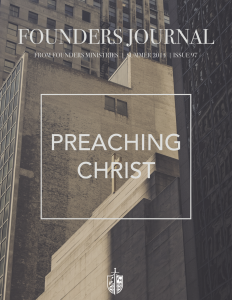In this article, I’d like to provide an example of how to preach Christ from OT prophecy. Christ is not mentioned in the text of the prophecy itself, but He is in the whole. Malachi 4:5–6 says:
5. Behold, I am going to send you Elijah the prophet before the coming of the great and terrible day of the Lord. 6. He will restore the hearts of the fathers to their children and the hearts of the children to their fathers, so that I will not come and smite the land with a curse.
Using the “grammatical, historical, and theological” hermeneutic, we interpret each OT passage according to the whole counsel of God in light of Jesus Christ, the center of God’s revelation to man.
Grammatically
In verse 5, God tells the remnant of Judah that “I am going to send” Elijah the prophet. He will come before the future day of Yahweh, described as “the great” and “the terrible” day. This is a specific day of judgment in the future (v. 1–3). It seems to refer to the same day described in Joel 2:31, Zephaniah 1:14, and Acts 2:20.
The time of blessing before this judgment day seems to come immediately after Elijah’s arrival. Both the time of blessing and the day of judgment are compressed into one future event as is common in OT prophecy. In Joel, for example, the promised blessing of the outpouring of the Holy Spirit on the day of Pentecost appears immediately before the day of judgment. Yet we have waited 2000 years after Pentecost for judgment day. Events that appear compressed in prophecy are often distant in time.
In verse 6, God sends Elijah the prophet prior to the day of judgment. Elijah’s mission is to “turn” (turn, return, restore) the heart of the fathers to (or “upon”) their sons, and the heart of the sons to (or “upon”) their fathers. This happens because of God’s gracious promise. It is part of God’s postponement of final judgment and destruction. Various other passages teach the same truth: Deuteronomy 30:1–6, Ezekiel, 36:25–26, and Jeremiah 31:31–34. A future kingdom of the heart will come because of God’s promises.
The idea of turning or restoring the hearts of the fathers to the children and the hearts of the children to the fathers means that the believing hearts of father Abraham, father Isaac, and father Jacob will be restored to all the children of Israel. Elijah will do this in his future ministry.
Some have misinterpreted this as a restoration of “covenant family” love between fathers and sons, but its Malachi context refers to Israel’s need of repentance. In Luke 1:17, an angel quotes this passage as fulfilled in the repentance of individual Israelites. While families may experience healing under the gospel, it will also cause division between fathers and sons (Matthew. 10:21, 35; Micah 7:6).
Historically
Malachi is the final book in the OT canon. The name means “my messenger.” It was probably written during the Persian period, after the second temple in 516 B. C. (1:10, 3:1, 3:10). The mention of a governor (1:8) points to the period of restoration, the time of Ezra and Nehemiah. During this time, both the priests and the people committed sinful abuses (Nehemiah 3:5, 5:1–13). These abuses likely occurred before Nehemiah’s second visit in 432 B. C., when he brought further reform (Nehemiah 13:7ff).
The two parts of the book address the abuses of the priests (1:6–2:9) and the unbelief of the people (2:10–4:3). God still loves them (1:2–5) and sends Malachi to encourage a disheartened people looking for prophetic predictions to be fulfilled. Malachi calls the people to repentance for their unbelief. True faith is more important than half-hearted rituals.
Theologically
Judah and Jerusalem had profaned the Second Temple worship and returned to sin. Because the previous Prophets had prophesied a glorious return with David as king, the people thought God had forgotten them. They left the faith of their fathers, Abraham and David. Now God prophesies again that Elijah will come before the great and terrible day of the Lord, restoring the hearts of the believing fathers to the unbelieving children and the hearts of the unbelieving children to the believing hearts of their fathers. God has not forgotten His covenant promises and will fulfill them in His time and way.
The meaning is explained in the NT. John the Baptist fulfills the prophecy of Elijah (Matthew 11:14). He comes in the spirit and power of Elijah to preach and restore the hearts of the believing fathers to the hearts of the unbelieving children and vice-versa. Physical descent does not matter in that day; God is able to raise up children of Abraham from stones (Matthew 3:9). This was accomplished in John’s ministry by calling the unbelieving children of Abraham to repent and be baptized before the coming of the great and terrible day of the Lord.
This day is the ultimate judgment of the world which begins at Christ’s first coming and is consummated in His second coming. The axe of judgment is already laid at the root of the trees (Matt 3:10–12). This day is explained in the NT as Christ’s ministry from His first to His second coming, ending in the day of “unquenchable fire” (Matthew 3:12).
So, John the Baptist fulfilled the prophecy to prepare the way of the Lord Jesus Christ who began to fulfill the judgment of the prophecy. Under John’s preaching, the believing hearts of the fathers were restored to the unbelieving children and vice-versa. Now, having heard of Christ’s first coming, we wait for that final day of the Lord’s judgment.
Consider the following sample sermon:
Introduction
Judah and Jerusalem declined spiritually after God delivered them from Babylon and Nehemiah rebuilt the temple. The priests offered blemished sacrifices and did not teach the Word of God faithfully. The people felt God had not given them the prosperity of David’s restored kingdom, which He promised after their return. Their hearts were not right with God. They complained against His plan.
So, instead of living faithfully and awaiting the Lord’s blessings in His time, they complained that God did not love them, and it was useless to be faithful.
So it is today. Many who profess the name of Christ only go through the motions of Christian living and worship. They think that God has not blessed them enough. They do not seek to live a holy life, no matter what happens. They are not thankful for God’s grace in Christ. Instead, many seek teachers who “tickle their ears” with erroneous promises of prosperity. They are not content with Christ alone.
Yet God was patient with Israel and promised to send Elijah to restore their unbelieving hearts to the believing hearts of their fathers. He promised a day of spiritual renewal as He had always promised. Who was this Elijah and how would he restore the spiritual life of Israel? When would He come and what would happen? And what does this mean for us today?
I. First, the future coming of Elijah
A. Elijah was one of the greatest of the OT prophets. He preached against the sins of Northern Israel. He performed great miracles. He brought down the Baal worship and defeated Ahab and Jezebel. He preached judgment against sin and mercy from God. Now Malachi promises that Elijah would come before the great and terrible day of God’s judgment. He would restore the unbelieving hearts of Israel to the hearts of their believing fathers and vice-versa. He would bring the spiritual change needed by Israel and a kingdom of the heart.
B. Jesus taught that John the Baptist is the fulfillment of this prophecy. The Jews waited for the literal Elijah to come but Jesus said John the Baptist came in the spirit and power of Elijah to fulfill the prophecy. Some still wait for a literal Elijah to fulfill this prophecy. But God’s manner of fulfilling His prophecies is not always in the exact form of the prophecy. His fulfillment is better. His fulfillment brings in the spiritual kingdom of Christ superior to the greatest physical fulfillment of the OT kingdom.
As Elijah did, John preached against the hypocrisy and unbelief of the covenant people of God. He called them to repent of their sins and be baptized to start a new life of faith and obedience. God could raise up children of Abraham from stones. But what He wanted was heart-children of Abraham’s faith. They were to believe in the Messiah, the Lord Jesus Christ, the true Son of David and Son of God. Christ’s coming was one of salvation and judgment, the Holy Spirit and fire, before the final great and terrible day of the Lord. This is how John fulfilled the prophecy.
II. Second, the Mission of John the Baptist.
A. The spiritual condition of the Jews. Just like the days of Malachi, the priests and the people went about their lives and worship without renewed hearts. They sought to please God by their own works and rituals. Yet they believed God did not care for them and give them the life they wanted.
B. The message of John the Baptist. But John the Baptist preached repentance from sin and belief in the Messiah as the way to be restored to God. He preached a life bringing forth the fruits of repentance in a holy life. In so doing, he prepared the way for the coming of the Son of David to set up the kingdom of God in the hearts of the people. He preached the Lamb of God who takes away the sin of the world.
C. The fulfillment of John’s mission. When Christ came on the scene, John said “He must increase but I must decrease.” (John 3:30). The people followed Christ for His miracles. But, as in the days of Malachi, when Jesus’ concept of the kingdom was not prosperity but righteousness, the people turned against Him and crucified Him. Yet in so doing, God provided the sacrifice to build a new kingdom of the heart. John’s mission was successful because He pointed to the true kingdom of God.
III. How does this apply to us today?
A. As in John’s day, many go through the motions of religion to make God prosper them. They depend upon their rituals instead of their repentance. They still look for a kingdom of prosperity instead of righteousness. Yet the real need is repentance and faith, a life of righteousness in following Christ. Is this your concept of being blessed by God?
B. Are you such a one? Are you still looking to your own half-hearted works and formal worship as the reason God should bless you with prosperity? You need to hear the message of John the Baptist before the great and terrible day of the Lord. You need to repent of sin and self-righteousness, believe in the Lord Jesus Christ, and enter the kingdom of righteousness by faith in Him. You must be born again to see and enter the kingdom of God.
Conclusion
Ritual and going through the motions of looking like a Christian is not true Christianity. It saves no one. You must repent of sin and bow to Christ as your personal Messiah to enter the kingdom of God. You must follow Him into fruits worthy of that repentance in a godly life.
If you profess to be a Christian, are you following a life of repentance and faith? Must you repent of love grown cold and ritual going through the motions? I have good news for you, Jesus Christ is still the Lamb of God who takes away the sin of the world. Go to Him, repent of your sins, believe in His atoning death for your forgiveness, and begin today to follow Him before the great and terrible day of the Lord.
























